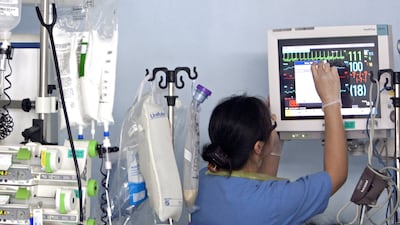Dubai is on track to achieve its target of attracting half a million medical tourists this year, five years ahead of schedule, with a revised strategy due next year, says a top official.
In the first half of the year, 16 hospitals provided treatment to 256,097 international and domestic medical tourists in the emirate, generating combined revenues of Dh1 billion.
“We expect that number to double when we collect data from across all the 30 hospitals and other facilities at the end of the year,” said Layla Al Marzouqi, the director of health regulation at Dubai Health Authority (DHA).
“We expect to increase the number of medical tourists by 12 to 13 per cent every year.”
She was speaking on the sidelines of the third International Medical Travel Exhibition and Conference (Imtec) in Dubai yesterday.
About 40 per cent of the medical tourists were from abroad and the rest from the other emirates during the first half of the year, said Linda Abdullah Ali, the authority’s head of medical tourism.
Dubai has been ramping up its medical tourism infrastructure, creating regulations and financial packages for the facilitators of medical tourism. Last month, the emirate introduced insurance for medical tourists with premiums of between Dh140 and Dh180 per trip in the event that medical complications develop within a month of treatment. The arrangement between the healthcare facility and the insurance company covers costs for return flights, hotel expenses and the treatment.
Of Dubai’s 2,900 medical facilities – such as hospitals, clinics and day-care surgery centres – 26 hospitals are private and four are state-run. At least 10 private hospitals are expected to open in the next two years. The government-funded Dh673 million Al Jalila Children’s Specialty Hospital is under construction.
Countries in the Arabian Gulf, the Commonwealth of Independent States and Africa were the top source markets for Dubai’s medical tourism industry.
“We are not competing against India. We have our own market, and quality is what Dubai thrives on regardless of the price,” Ms Abdullah Ali said about India, which is striving to become a medical tourism destination.
Although plastic surgery and wellness treatments are the most popular services, orthopaedic surgeries are the top revenue generators.
At the 100-bed Prime Hospital near Dubai International Airport, about 5 per cent of its patients, or 2,000 a year, are foreign medical tourists, according to Riaz Khan, the general manager of Prime.
“While we focus on plastic surgery and bariatric surgeries in line with DHA, we get patients for health check-ups to knee replacement surgeries,” he said. “We are also developing neurosurgery and complicated dental health care.”
Prime Hospital works with Le Meridien and Al Bustan Rotana for patient stays, as well as two medical facilitators who help patients to secure travel visas, book hotels and select healthcare packages.
“In Dubai, regulations are strong, along with strong clinical outcomes at a reasonable cost,” Mr Khan said.
ssahoo@thenational.ae
Follow The National's Business section on Twitter

